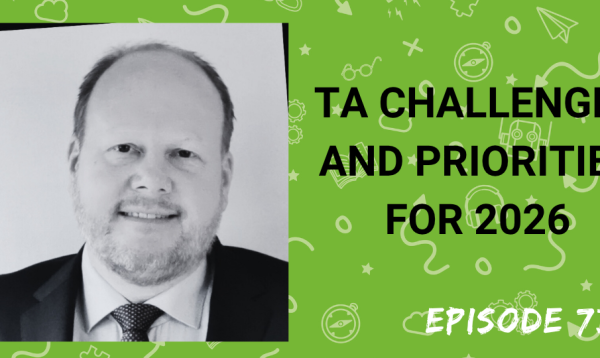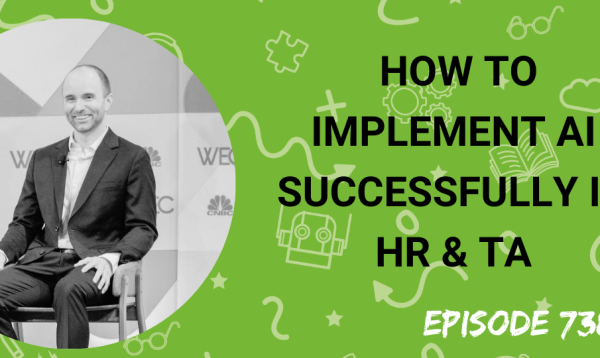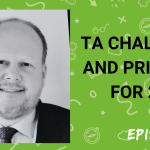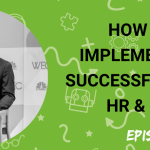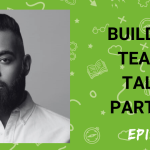More and more companies are recognizing the importance of building an employee experience that enables them to attract, retain and develop the talent they need. There is a lot of theoretical debate about how this should be done, but how are things actually working on a practical level.
My guest this week is Tonille Miller Global VP of Culture and People Engagement at Startek. Startek has 50,000 employees across 13 countries and in our interview, Tonille talks through some of the practicalities of creating an employee experience at that scale.
In the interview we discuss:
What does employer experience actually mean and how do you measure it
Creating a people experience that treats employees the same way as customers
How to keep people engaged
The challenge of building a culture after a significant global business merger
Building a corporate careers site and using it to recruit passionate, purpose-driven people
The role of technology in employee experience
Tonille also talks about her experience adapting a global strategy to work in local markets and shares her thoughts on the future of employee experience.
Subscribe to this podcast in Apple Podcasts
Transcript:
Matt Alder [00:00:00]:
Support for this podcast comes from Boone. Boon is a unique platform that’s making referral based hiring effortlessly scalable and infinitely effective. Maximize your recruiting strategy today by visiting goboon.co to learn more and schedule a demo. That’s Goboon Co and Boon is spelled B double O N.
Matt Alder [00:00:42]:
Hi everyone, this is Matt Alder. Welcome to episode 192 of the Recruiting Future podcast. More and more companies are recognizing the importance of building an employee experience that enables them to att, retain and develop the talent they need. There’s lots of theoretical debate about how this should be done, but how are things actually working out at the practical level? My guest this week is Tonille Miller, global VP of culture and people engagement at StarTech. StarTech has 50,000 employees across 13 countries, and in our interview, Tonille talks through some of the practicalities of creating an employee experience at that scale. Hi, Tonille, and welcome to the podcast.
Tonille Miller [00:01:30]:
Thank you for having me, Matt.
Matt Alder [00:01:31]:
An absolute pleasure to have you on the show. Could you just introduce yourself and tell everyone what you do?
Tonille Miller [00:01:37]:
Sure, I’d be happy to. So, Tonille Miller, I am currently with StarTac and I am their global VP of Culture and People engagement.
Matt Alder [00:01:46]:
Fantastic. And I suppose a good starting point would be if you could tell us a little bit about StarTech for those people who’ve not heard of the company before.
Tonille Miller [00:01:57]:
Sure. So currently we just merged with another global organ as well, so we’re actually twice as large as we used to be. But essentially we are business process outsourcing, customer experience and engagement across the globe. We’re across 13 countries right now, and I believe five or six continents. And so, yeah, and like I said, I think we’re at around 50,000 people.
Matt Alder [00:02:21]:
Fantastic stuff. And talk us through the kind of people challenges that brings you in a company of that size.
Tonille Miller [00:02:29]:
Sure. So there’s a few different things at play here. There’s of course, the fact that it’s a large organization and of course it’s a global organization, but there’s also the fact that, you know, a lot of the work is call center work. For better or worse, whatever perceptions positive or negative folks may have about that, it definitely is a different environment than, say, the average corporate office in the middle of America somewhere. So that’s definitely one piece of it. Another piece is that the majority of our employees are millennials. And of course, everyone has their own view on that word I don’t have a preference on it either way, but I do know that it always conjures up different images in one’s mind. So really, with us, a lot of what we focus on is engaging and creating an experience for our people. That’s really what they’re looking for. As we all know, when you’re a millennial or a centennial or really any demographic, it’s really about the people experience. Especially nowadays, and especially because our business is very much focused on customer engage, customer satisfaction, and things along those lines. We try as much as we can to really bring that same mindset with our people. So really treating our people like they are our customers internally, if that makes sense.
Matt Alder [00:03:43]:
Fascinating stuff. And I can see that that’s obviously in the DNA of the organization. So your job title, VP of Culture and People engagement, that would be a title that probably wouldn’t have existed a few years ago. What does that actually mean, and how does it work in pract?
Tonille Miller [00:04:02]:
Mm, that is a good question. And to be honest, I, you know, before a few years ago, I hadn’t heard of this type of a title or a Chief Culture Officer or anything like that either. But I’m so glad that organizations are starting to move in this direction. I think it’s very intelligent on their part. So essentially, what it looks like in my organization is, again, because my role is global, I’m not tied to one territory or one geography. So I end up partnering with all of our different geography heads and HR heads and different folks in the field as well, and really understanding, you know, what are some of their pain points, what are some. Maybe some of the engagement issues they might have in their particular location. So there’s that more nuanced, localized piece. And then on top of that, it’s really now that we’re bringing the two organizations together, or I guess we have already. A lot of my role at this point in time is really continuing that integration work at a global level. So when it comes to vision, mission, values, culture, cultural pillars, things like that. So really having that great, solid, kind of overarching, broader cultural foundation that we all can kind of tap into, but then also making sure there’s more local nuanced in each geography and with each client as well.
Matt Alder [00:05:09]:
Absolutely. That makes perfect sense. I mean, can you sort of give us some examples of how you, you know, some of the work that gets done to engage people and keep them engaged with the culture that you’re creating?
Tonille Miller [00:05:23]:
Sure. And I will preface this with the fact that my role is new and the merger is somewhat fresh as well. So I can speak to the time that I’ve been there before that I don’t know. But in my time, the short time that I’ve been there, I’ve gotten the opportun to travel around and meet a lot of the leaders in our different geographies and really sit down with them and some of their people and understand what it’s actually like on a day to day basis for them. And even though the type of work is the same, it really differs across geographies and depending on which client a particular team is working on. So the beginning of my role has really been a lot around that, just really building those relationships, collecting data points, understanding what things are like today. And now what we’ve done is we’ve moved a lot more into implementing different things. So part of that is getting all the entire organization on different, on the same different technology platforms. So a learning management system, employee engagement app, different technologies, really understanding what different groups are using across the globe and then getting everybody on one standard one. And then in addition, there’s also a large program we’re working on at the moment which is really developing our leaders at every level. It’s kind of a new program that we’re spinning out. And what it really entails is leadership development offerings really standardized across all of our geographies for every level. So that regardless of how junior or senior you are, you’re getting a leadership development training and coaching and role modeling from day one. So that by the time you get higher and higher in the organization, you’re even more and more astute at those capabilities. So those are two of the bigger pieces right now that we’ve been working on. A lot of what we do also is community involvement. Depending on the geography, it’s very involved in our communities. And so the different geographies have their different organizations and groups that they partake in and so really ramping up those programs quite a bit. That’s a big piece for us. And then just really, you know, one of the key pieces that I’ve found in my research in my time over the years is, you know, whether it’s millennials or any group, we really want to feel close to our customers or to the end result of our work. And so what we’re trying to do now also is really build in ways for our employees to see how their day to day work touches the customer, touches the endpoint so they can say, oh, although I could just look at my job as being on the phone all day, you know, At a call center, actually, if I think about it and I see how the dots connect, I realize, oh, I helped solve that customer’s problem. And then here’s that ripple effect and how they told their neighbor about us and this. And so all these wonderful ripple effects can happen. So it gets to a point where literally changing the world one conversation at a time, that’s, you know, it’s kind of one of our different models that we use internally. And it’s really about that, connecting those day to day conversations on your teams as well as with our clients, and connecting that to how that impacts those clients, how it impacts our communities, and then hopefully on a large scale, the world.
Matt Alder [00:08:20]:
So following on from that, there’s obviously a huge amount of talk and discussion and debate about employee experience and what that actually means and what companies should be doing, where it starts, where it ends, and what actually is it? What does employee experience mean to you?
Tonille Miller [00:08:40]:
So I think of employee experience. I don’t know if you know who Jacob Morgan is, but he has a great podcast.
Matt Alder [00:08:46]:
I’ve had him on the show.
Tonille Miller [00:08:47]:
Right. Yeah, he’s definitely one of my gurus. And so I really think about it the way that he does. Right. So there’s like technology, there’s the physical space and then there’s the different policies or practices or way you, ways you interact. So I really think it’s all of those things and probably even more. But I think if I was going to put it into kind of a framework, that’s how I think of employee experience. It’s really everything that touches the employee. Just like when you think of customer experience, it’s every touch, every nuance, every thought in their mind about the experience.
Matt Alder [00:09:19]:
And how important is the role of technology in that?
Tonille Miller [00:09:23]:
I think very important. And I think, of course, it would depend on the industry, I think, especially with this generation, and not to keep making it generational, but in general, not even generationally. But the fact that technology really is a key part in everybody’s life at this point in time, I think it’s a huge impact. But then if you look at specifically our industry, again, it’s a lot of phones, it’s chatbots, it’s a lot of technology of all different types. So for us, it’s a big deal.
Matt Alder [00:09:49]:
And is this something that, is this something that you can measure the quality of? And if so, how are you going about that is a good question.
Tonille Miller [00:09:57]:
And I think that’s something that everybody is kind of working on at the moment. What we used to do as an organization and you know, any organization, and most of them still do it, is the annual or biannual, if you’re lucky, employee engagement survey. I think depending on where you stand on this. I know I can say that I personally stand on that in the same way that I stand on the annual performance review. And I think that it’s just too little too late, if that makes sense. Especially if in our industry in particular, turnover can be high at times. And so by the time you even find out how engaged somebody is or isn’t, they’re already gone. So for me, I think that to measure employee experience, you could do it with things like surveys. But I would really recommend that people do it monthly, like short pulses or weekly, or, you know, collect all the data points like your weekly one on ones, use those as data points, use short pulses, as I mentioned, as data points, different things like that. But I definitely don’t think it should be once annually.
Matt Alder [00:10:56]:
Absolutely. I mean, that makes perfect sense. Just before we started talking, I was looking at your corporate career site and there’s really interesting messaging on there in terms of the way that you talk about the type of people who you want to kind of come and come and work for. You could you sort of, you know, talk us through that a bit and talk us through how you’re sort of reflecting and communicating the culture and experience that you’re building internally, externally, to potential hires?
Tonille Miller [00:11:32]:
Sure, yeah. I mean, I think as you mentioned, the site really does outline this, and we really are looking for people that are passionate about like customer passion. Right. So they’re passionate about, just about doing this great work and all the great impacts they can have on people, but they’re also passionate about the customer’s brands. Because in our industry specifically, you know, most of our work, we have our own internal culture. But then typically an associate or an agent would be put on a particular client team. And in that sense, they also need to really kind of embody the cultural values of that client, if that makes sense, because they’re serving as an arm of that client. So we want people that are really passionate about these things first of all. Also, Purpose driven is a really big part of our organization. As I mentioned, we do a lot in our communities. So we want people that are very focused on their mission, our mission, the purpose. And again, to go back to our tagline of changing the world one conversation at a time, we really believe that. And so we want people that are on board with that type of mission. And then the other piece too, I think, again goes back to the customer passion, customer service. Because our industry is customer focused in that way, we really need to find folks that are excited to want to do that and to want to serve the customer and give great customer service. So I think those are some of the key things we’re looking for. But in addition, I think before we merged with our current merged organization, and especially now, one of our big differentiators, I think, and is a big part of our culture is our diversity. So as I mentioned, we have folks all over the globe and not just different countries, but diversity in ways of thinking, diversity of experiences, all kinds of diversity. We love that because, number one, it just makes the organization better and it’s such a greater place in that regard. But also because we do serve clients all over the world, it just makes sense that our internal diversity would mirror the external diversity.
Matt Alder [00:13:23]:
So you mentioned that this is a reasonably new role and obviously the company’s undergoing a lot of change at the moment. While you’ve been in this, while you’ve been doing this job, what surprised you the most?
Tonille Miller [00:13:38]:
That’s a good question. You know, I will say there’s been a lot of surprises, not good or bad necessarily, just differences. Right. Because it’s a global role. And so I think, I think if I was going to pick one, for me, it’s just been a fascinating education in the sense of just learning how other folks in other countries work. Right. So I mean, like I said, a lot of our team is all over the globe. For example, our folks in the Philippines, they end up working the same hours as people in the US So they work overnight because their clients are located in the U.S. and then, you know, going to India and Malaysia and Sri Lanka and some of these other locations, just really learning about the diversity in the cultures and how that shows up in the workplace, that has been fascinating. So I think for me, the surprise exciting pieces are things that surround all of that and just follow the nuances of working in a global organization of this size.
Matt Alder [00:14:27]:
I mean, that’s really interesting because there’s always a lot of debate about how companies get consistency in terms of employer, brand and culture and experience on a global basis. But at the same time, make sure that’s very, very relevant in local markets. Obviously it’s still early days, but how, what do you think the best way to achieve that is likely to be?
Tonille Miller [00:14:52]:
That is something that is my primary focus at the moment because we’re doing a lot of different integration activities in my role, like I mentioned. And so my approach, the one that I’ve Taken so far, and it’s proved to be pretty successful from what I’ve gathered, is really trying to involve as many folks as possible without having a million cooks in the kitchen, of course, but really trying to partner with all the different people from the different geographies. In the early stages, when we’re brainstorming and thinking through what are our values going to be, what is our mission, and those types of things, really bringing them into the fold and letting them co create with you and getting their feedback so that they’ve already kind of bought into it and they’re already on board and they’re already supporting it. And then when you roll it out, it’s literally partnering again with them to say, all right, so, you know, we took your feedback into consideration. This is what we decided on. You know, let’s roll this out. But then also rolling it out in the sense of it’s not a mandate, if you will, it’s more like, okay, so this is the direction we’ve decided to go, but here are some areas where you have creative license and you can tailor it to the local nuances and that type of thing. So I think it’s kind of taking a global and a local approach seems to be the best way to go.
Matt Alder [00:16:02]:
Absolutely. And so, final question. We sort of mentioned that employee experience is developing, emerging as a field of thought and practice. What’s your view on what it might look like in the future? So, say we were having this conversation in a couple of years time and we were talking about employee experience. What would we be focusing on?
Tonille Miller [00:16:27]:
I think a lot about this question. This is a really good one. I think it depends, right, Because I think some organizations are very much ahead of the curve. And so certain things that I would say for them would be very different than some that are just getting into it and that type of thing. But I would say definitely technology is going to become more and more a focus. And in fact, one of the areas that I spent a lot of time looking at, just for fun, if you will, is those industries where robotics and RPA and AI and all those different pieces are coming into the fold rather quickly. How does the workforce work with that? As we know, everyone’s kind of nervous about jobs going away, but we also know there’s going to be a ton of new jobs that were never even around before because of technology. So when I think about employee experience, I’m thinking about how do we help our people work comfortably and, you know, competently and confidently with these new technologies that are coming? So that’s where I’m spending a lot of my time at the moment, and I honestly don’t know what that looks like. I think a lot of it is going to be kind of like easing into it. I don’t think anything’s going to happen overnight, but I think a lot of it will be kind of, you know, job sharing and things like that with technology.
Matt Alder [00:17:34]:
Tonille, thank you very much for talking to me.
Tonille Miller [00:17:36]:
Thank you for having me.
Matt Alder [00:17:38]:
My thanks to Tonille Miller. You can subscribe to this podcast in Apple Podcasts or via your podcasting app of choice. The show also has its own dedicated app, which you can find by searching for Recruiting Future in your App Store. If you’re a Spotify user, you can also find the show there. You can find all the past episodes@www.rfpodcast.com on that site, you can subscribe to the mailing list and find out more about Working with me. Thanks very much for listening. I’ll be back next week and I hope you’ll join me.


